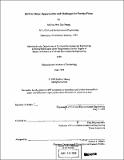BOT in China : opportunities and challenges for foreign firms
Author(s)
Huang, Melissa Wen Dan, 1975-
DownloadFull printable version (9.915Mb)
Alternative title
Build-Operate-Transfer in China
Other Contributors
Massachusetts Institute of Technology. Dept. of Civil and Environmental Engineering.
Advisor
Fred Moavenzadeh.
Terms of use
Metadata
Show full item recordAbstract
The People's Republic of China (PRC) has the world's fastest growing economy, with further growth currently depending on improvement of physical infrastructure. As it enters what many predict to be one of the greatest infrastructure development booms in history, China presents numerous opportunities to international engineering, procurement and construction firms. The PRC has recognized that further economic growth depends on improved infrastructure, but it is short on cash. In order to finance and build much of the infrastructure required for continued economic growth, the Chinese government is looking to use the Build-Operate-Transfer (BOT) approach, taking advantage of the interest of foreign investors to meet China's huge infrastructure needs. As a result, while there are many tenders for conventional construction contracts, there are even greater opportunities (and potentially higher margins) for foreign firms that can supply the capital to fund construction as well as the technology and management skills to build and operate infrastructure facilities. However, there are strings attached. The potential benefits of participating in the Chinese infrastructure boom are accompanied by correspondingly large risks. With an economy in the midst of a transition from controlled to open market, politics mired in bureaucracy and corruption, and a legal system offering little enforceability of contracts, China presents some extraordinary problems for foreign construction firms hoping to participate in the BOT boom. China is not an easy place to do business. In fact, BOT projects in the PRC are fraught with risks, from currency convertibility and inflation to government approval problems and the lack of a reliable legal system. This paper looks at the growing infrastructure demand in China and how both China and foreign companies can benefit from working together to tackle that demand. The paper first outlines the extent of opportunities for international EPC firms in China. Next, it identifies the risks that must be considered before participating in Chinese infrastructure Build-Operate-Transfer concessions. Finally, the paper will examine methods by which international constriction firm's can mitigate these risks and maximize its benefits in the Chinese BOT boom.
Description
Thesis (S.M.)--Massachusetts Institute of Technology, Dept. of Civil and Environmental Engineering, 1999. Also issued in pages. Includes bibliographical references (leaves 124-125).
Date issued
1999Department
Massachusetts Institute of Technology. Department of Civil and Environmental EngineeringPublisher
Massachusetts Institute of Technology
Keywords
Civil and Environmental Engineering.